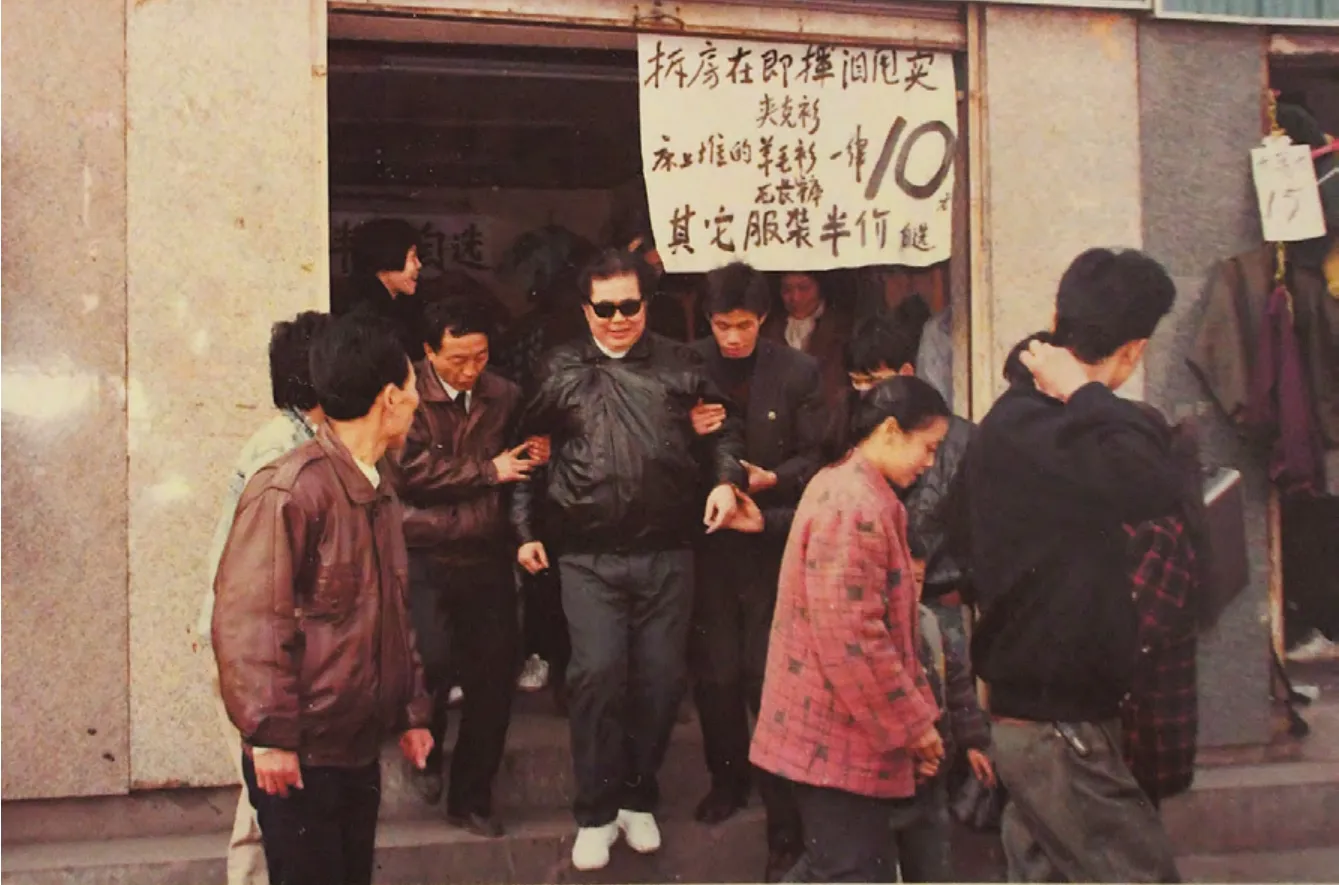Revival of Hanzheng Street
Text by Li Jianjun & Ai Hongxia
Photos by Su Zhuolin & Zhang Peng
Hanzheng Street,one of the most attractive marketplaces in China,has been a commercial scene since the founding of the nation. After the introduction of reform and opening-up policy in particular,local merchants pioneered many firsts here. The street has injected vitality to the private sector and fueled the country’s historical transition from a planned economy to market-oriented economy.
In the exuberant trade market covering 1.67 square kilometers,Hanzheng Street today brings together more than 18,000 merchants and 54 wholesale markets of all kinds,racking up nearly 100 billion yuan in annual turnover.
First-Generation “Blind” Entrepreneurs
The 79-year-old “Blind Man” Zheng Juxuan was pretty much a household name on Hanzheng Street in the 1980s. As one of the earliest self-employed entrepreneurs who realized the income of 10,000 yuan and 1 million yuan,Zheng represented a typical example of Hanzheng Street’s first-generation entrepreneurs.
Zheng started a stall in Duofu Lane selling sewing kits at the age of 19,and secretly organized a band of blind peddlers during the Cultural Revolution. “Speculation!” In the days when private economy was stifled,Zheng was put behind bars twice.


郑举选讲述他的经历 Zheng Juxuan telling his business experience

郑举选在汉正街 People helping Zheng Juxuan leave a store
After repeated disappointments,the afflicted man decided to break away from his business. It was at this time that some blind friends visited him,bringing a good message that the policy changed and selling on the street became legal.
Gingerly,Zheng started to sell buttons on a bamboo bed. In November of 1979,Zheng Juxuan was listed among the first batch of 103 individual merchants to receive business certificates for petty goods. His integrity and honesty won him a brisk business and a pool of wealth in just a few years.
“It’s an encroachment of private economy upon public sector,and chances are high that Hanzheng Street has strayed away from socialism,” complained some green-eyed people. On August 28,1982,thePeople’s Dailypublished for the first time a market-focused editorial entitled “Experience of Hanzheng Wholesale Street deserves attention.” In the article,Hanzheng Street was recognized for its contribution towards invigorating market growth,making people’s lives easier,and creating many jobs. Its role couldn’t be replaced by the state and collective economies.
The editorial brought the clamor to a halt. A swarm of peddlers flocked to Hanzheng Street where many big names were born. The street has been a hot destination for state leaders,UN officials,and foreign journalists since.
Following Hanzheng Street,such small commodity markets as Yiwu,Shenyang Wu’ai Street,and Shijiazhuang Nansantiao Street have mushroomed.
Highly Educated Entrepreneurs Set Trends in Hanzheng
As time changes,Hanzheng Street has gone through ups and downs.

The first-generation entrepreneurs that once dominated Hanzheng Street are now nowhere to find. When the younger generations start their businesses,most have bachelor’s,master’s,or even doctor’s degrees.
“I will definitely take another path without Hanzheng Street.” Wang Kang,graduated from the School of the Gifted Young of Huazhong University of Science and Technology,was the first entrepreneur in Hanzheng Street with a master’s degree (in computer science). With 22 years of dedication,Wang has made his business GREENGARDEN ARTS a leader in the handicraft industry.
Last year on May 22,more than 30,000 kinds of gifts were displayed at the exhibition hall along Hankou Riverside Avenue. “Most of our products are sold on e-commerce platforms.” According to Wang,big data technologies have been adopted for customer services to build a platform targeting customers around the country.
In the new age,many overseas returnees also fix their eyes on Hanzheng Street. In 2015,Yang Xiaolong,a graduate of the University of Manchester and his elder sister Yang Fan,who finished her schooling in India,jointly started Longfan Textile,focusing on exporting to countries along the Belt and Road. In the same year,Wang Binhong who graduated from the University of Minnesota started in commercial property development in Hanzheng Street,“I have bought a house in Wuhan,and I will settle down here.”
According to Wang Kang,most of the first-generation entrepreneurs started their business to earn a living. They amassed a fortune because they were industrious,hearty,and aggressive,and they had an eye for opportunities. As competition heats up,business growth relies on strong learning capability,adaptability,and fine management. In this light,the second-generation entrepreneurs are more competitive.
He believes that local merchants in Hanzheng will embrace a bigger world only when more and more highly educated merchants join the ranks.
“New Hanzheng” Stuns the World
“There are two best places to witness China’s economic development course—Shenzhen for reform and opening-up,and Hanzheng Street for enlivening the economy.” Hanzheng Street is known as the forefront of the Chinese market economy and the indicator of reform and openingup achievements.
“China’s business prosperity will not be a reality without structural reform and innovation inspired by Hanzheng Street,” said Zhu Yanfu,a professor at Zhongnan University of Economics and Law. Hanzheng Street has made contributions to China’s reform and commercial development no less than “Xiaogang Mode” in Anhui.
In 1979,a mainly private ownership structure was introduced to Hanzheng Street,which put an end to the monopoly of state-owned and collective enterprises. Its merchants were the first in China to adopt longdistance sales,i.e. “buy from and sell to all parts of country,” showing others the great value in commodity circulation,which transformed an over-emphasis on production over circulation. At the same time,regional blockade in the commodity market was eliminated,and a national open market system was built. Hanzheng Street helped raise people’s commodity awareness and recognize the role of the value of law.
Despite the huge success,leadership is never a permanent thing. The Yiwu Small Commodities Market,established in 1982,has ranked No.1 by revenue for more than ten years in a row. Its toys and Christmas gifts have been popular in European countries and America,and it was even listed in 2002. By contrast,the ranking of Hanzheng Street dropped from No.3 to No.7.
That,however,does not mean Hanzheng Street has already gone downstairs. It is transforming from a traditional small commodity wholesaler to a central service area. In the past seven years,thousands of processing service providers and tens of thousands of merchants have built their plants in more than 30 industrial parks in neighboring counties and cities. The “front shop and back factory” mode was replaced by a new one: design and R&D in the street,and producing,processing,warehousing,and logistics off the street.
Through the China-Europe Train and the Belt and Road Initiative,along with cooperation with Alibaba and JD in the e-commerce market,Hanzheng Street is reshaping its influence in Central China as it aspires to become “the Root of Hankou,the Heart of Wuhan,and the Window of the World” through business reform.


